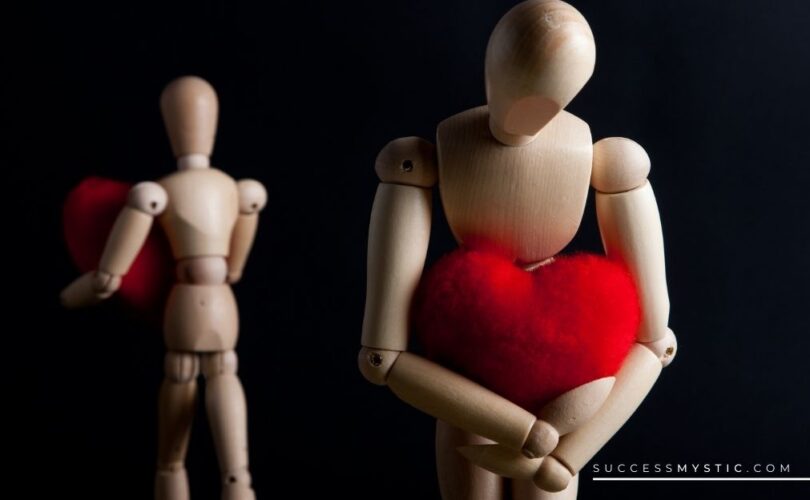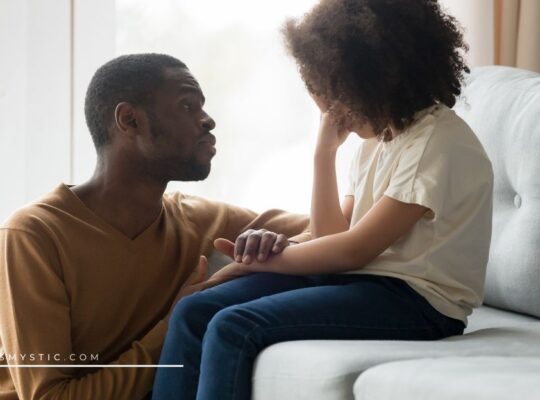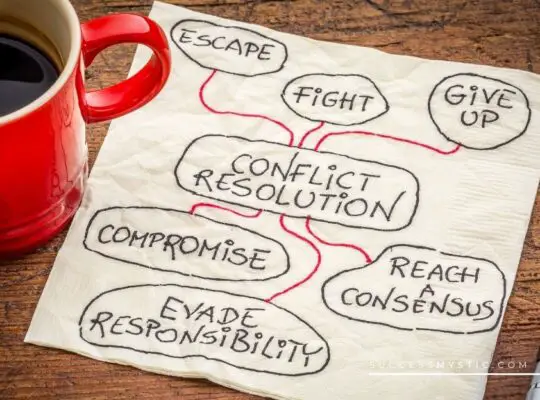Most people will experience at least one breakup over the course of their lifetime. Some breakups are easy to brush off and move on from, especially if the relationship with your partner was strained or insincere. Other breakups can send you into a downward spiral of depression that’s often difficult to fully recover from.
There’s no set process for dealing with the loss of a relationship because each relationship is unique in its own way.
However, it helps to fully understand how the grieving process can relate to a breakup and the actions you can take to help yourself to fully heal. That’s exactly what we’re going to be reviewing in this piece.
The main thing to remember is that you can heal. You can learn from the process and grow as a person and go on to live a fulfilled and content life.
One doesn’t simply grieve the loss of a relationship. One grieves the loss of the possible future, as well as the wiping-out of the past.
Katerina Stoykovaklemer
Progressing Through The Grieving Process
“Be patient and tough; someday this pain will be useful to you.” ~ Ovid
Most people would associate the grieving process with the death of a loved one or a severe medical diagnosis. Yet, you could experience grief for just about any type of loss in your life, including the loss of a relationship.
Grief is typically broken down into five stages, referred to as the “Five Stages of Grief” developed by Swiss psychiatrist Elisabeth Kubler-Ross. Let’s take a look at what you might experience at each of these stages while you’re coping with a breakup.
- Denial: When you’re in the denial stage, you might be thinking, “This can’t be happening.” You haven’t come to terms with the fact that the relationship has ended and might even act as if you’re still with your partner.
- Anger: When you’re in the anger stage, you’re feeling intense emotions related to the breakup. You might be angry at your partner for ending the relationship, yourself for letting the relationship fail, or even just people telling you that it’ll get better with time.
- Bargaining: When you’re in the bargaining stage, you’ll do just about anything to get the relationship back. It’s possible that you’ll beg your partner for forgiveness or even pray to God that you end up working things out in the future.
- Depression: When you’re in the depression stage, you’re finally feeling the full effects of the loss. It could be difficult to make it through the day without crying and you might have difficulty falling asleep or eating regularly.
- Acceptance: When you’re in the acceptance stage, it doesn’t necessarily mean that you’re okay with the ending of the relationship. However, you are able to move past it and continue on with your life without the breakup holding you back.
Keep in mind the fact that you might not experience every single stage of grief, you might skip over a few and go back, or you might complete the process in a different order. Either way, it’s important that you allow yourself the time to grieve and reach the acceptance phase.
Denying or putting off your grief doesn’t save you from the heartache of a divorce or a breakup. In fact, it just guarantees more emotional turmoil and the ideal that you’ll have to deal with it at a later date (weeks, months, or even years later).
“Every time you thought you couldn’t keep moving forward, you did. Take a moment to appreciate your strength.” ~ Karen Salmanson
Working Through Your Emotions
“All that matters is that I have myself” ~ Unknown
Whether your relationship ended mutually, or the breakup came as a surprise, it’s important that face your emotions head-on and cope with them in a healthy manner.
Before you get to actual coping strategies, you need to allow yourself to work through your emotions. Here’s a look at things you can do to aid you in this process.
Knowing Your Worth
It’s not uncommon to use a relationship as a way to define yourself. Instead of being your own individual, you’re so-and-so’s girlfriend or boyfriend (or even husband or wife). When the relationship comes to an end, you suddenly have no idea who you are as a person.
That’s why it’s important that you work to separate yourself from your ex-partner in your own mind. You were your own individual before you met them, and you’ll be your own person after the relationship ends.
Regardless of how your former partner made you feel, there are good qualities about you. Take the time and effort to identify your best characteristics, talents, skills, personality traits, and what you have to offer as an individual.
Most importantly, remind yourself of your worth.
Make it a point to consider the other relationships that you have in your life and take the time to nurture those. You might even learn something new about yourself by building onto these relationships instead.
Focusing on the Future
“It is when I struggle that I strengthen. It is when challenged to my core that I learn the depth of who I am.” ~ Steve Maraboli
One of the worst things you can do when a relationship ends is to find yourself living in the past. Though the relationship likely meant a lot to you and severely affected you when it ended, it’s important to live in the moment and focus on the future.
To do that, it might be a good idea to come up with plans for the future, whether they’re related to relationships or not. Think about things you’ve always wanted to do and do what you can to make them a reality.
Most importantly, remember that there’s nothing you can do to change the past. Do your best to leave the past behind you and try to keep yourself from ruminating on the negative thoughts associated with the end of the relationship.
Improving Yourself as an Individual
When a relationship ends, you might find yourself at a crossroads in your life. However, being free from the ties of a relationship allows you to focus on yourself as an individual and make the changes you need to become a better person.
Take the time to think about who you are as a person and the qualities you don’t particularly like about yourself. Then, take the time to develop a plan to address these qualities and improve who you are as a person.
It’s also important that you avoid getting into a relationship impulsively after a relationship ends. The end of a relationship is the perfect time to work on you and mold yourself into a person that can thrive in your next relationship.
Feel!
Everybody copes in a different way, especially when a relationship ends. You might be happy that you’re no longer in such a high state of stress, sad that you don’t have your partner by your side, or even angry that you wasted so much time on somebody that could hurt you.
All of your emotions are valid, whether or not they’re seen as the norm. Feel free to cry, scream, or even laugh when it makes you feel better. Just don’t let the emotions pile up inside until they eventually get too difficult to suppress.
To protect those you love, make sure you keep them in the know about what you’re feeling. The last thing you want to do is put a strain on your other existent relationships because you accidentally lashed out at somebody who was just trying to help you.
Do whatever you can to not take your emotions out on other people, though this can be easier said than done.
“One of the best times for figuring out who you are and what you really want out of life? Right after break-up” ~Mandy Hale
Developing Positive Coping Strategies
“There is something better out there for me” ~ Unknown
It doesn’t matter if your last relationship lasted for 10 weeks or 10 years. You probably won’t completely move past the breakup in just a few days or even a few weeks as you might like to. To help get you through the healing process, it’s important to develop positive coping strategies to ease your mind and soul.
There are plenty of positive coping strategies out there, but not every single one will work for you or your particular breakup. That’s why we’re going to go over a wide range of positive coping strategies that you can try to apply to your own life.
Express Your Emotions
Self-expression is key to coping with just about any stressful or painful situation in your life. It’s important that you acknowledge your emotions and find a method of expression that works best for you and reduces the weight on your shoulders.
So, what does that mean exactly?
Well, there are plenty of ways that you can express yourself. You can obviously turn to a loved one or a friend and discuss the trials and tribulations of moving past your breakup. This can be a great source of advice, but also a method of just venting your emotions.
But sometimes, you just can’t put your feelings into words, and you feel like your emotions are being bottled up. That’s why you might want to try self-expression through the arts.
- Painting
- Writing in a journal
- Writing poetry
- Drawing
- Dancing
- Playing an instrument
- Singing
- Listening to music
What’s even better is that you don’t have to necessarily be skilled at any of these things. That means your poems don’t have to rhyme and your paintings don’t have to be ready to submit to your local art museum.
This is simply a method of expressing your emotions about the breakup that you might be unable to put into words that other people would understand. This is just for you and your own mental health, though you might find a new hobby by the end of it.
“New beginnings are often disguised as painful endings” – Lao Tzu
Do Something Brand New
Relationships are great because you always have somebody by your side to go places with and do things with. When that relationship ends, it might make you emotional to do the things you once did with your former partner.
That’s understandable, but it doesn’t mean that your entire life should be a standstill. It’s time to find new things to do and redefine yourself as an individual.
New things you might want to try when a relationship ends.
- Hiking, kayaking, or birding
- Photography or a specific style of art
- Learn a new instrument
- Go somewhere you always wanted to go
- Branch out and try to make new friends
- Learn a new hobby (fishing, scrapbooking, puzzles, etc.)
The goal is to get out of your comfort zone and realize that there’s a whole world out there that you’ve yet to experience. You once enjoyed certain locations and certain activities with your partner, but there’s a lot more out there left to be discovered.
Better yet, you don’t have to stick to one new thing! You can do something new once a month, once a week, or even once a day.
Improve Yourself
It’s easy to let yourself go after a relationship ends, especially if the breakup really took a toll on you emotionally, mentally, and physically. But it’ll be in your best interest to do things to improve yourself as a person.
“I’ve learned more from pain than I could’ve ever learned from pleasure.” – Unknown
What does that mean for you?
Focus on improving your health and relationships with other people in your life. Here are some good ways that you can do that.
- Rekindle friendships from the past (especially if they became strained during your relationship)
- Spend more time with loved ones and friends
- Get more exercise (resistance training and/or aerobic training to boost your mood)
- Start a new balanced diet
- Cut out bad habits that are negatively affecting your health (alcohol or drugs)
- Set a schedule you can stick to
Ultimately, you want to use the ending of your relationship as a positive experience, though this seems quite difficult at first. To do this, it’s time to put yourself first for once. Figure out what makes you happy and what’ll make you a better person and actually do it.
Treat Yourself
When a relationship ends, you give up on a lot of things. You might not eat as much as usual, you might find it difficult to sleep at night, and you might not have the energy to even perform daily tasks like showering or changing your clothes in the morning.
Take the time to treat yourself! Do something for you and only you. Here’s a glimpse at what that might look like.
- Getting a massage
- Going on a road trip
- Taking a day off of work to just relax
- Getting a new hairstyle
- Getting your nails done
- Going somewhere you’ve always wanted to go
- Go out to your favorite restaurant
- Cook your favorite meal
This probably won’t be a long-term fix, but it can help you if you’re struggling a bit more on certain days. Treating yourself can definitely provide you with a little happiness and give you something to look forward to in such a trying time.
Give Back
It’s possible that you just want to think about anything other than yourself or your ex-partner. The good news is that you can make yourself feel a little better by actually giving back to the community and those that really need it.
It feels good to put a smile on somebody else’s face and realize that you’re making somebody else’s life just a little bit easier. Even better is that there are tons of ways to do this.
How you can give back after a breakup.
- Reach out to a friend that really needs a shoulder to lean on
- Volunteer for cleanup efforts at the local park
- Volunteer at your local food bank
- Do something nice for a sick or elderly neighbor
- Donate blood or plasma
- Surprise somebody you care about with a gift
When you’re in a position where you’re struggling like you are right now, the last thing you might want to see is that others are struggling even more than you. There are people out there that have trouble securing their next meal or can’t get around the house to do yard work.
You’ll feel good inside when you help other people and you’ll definitely get your mind off of your breakup, at least for a little while. Even better is the fact that you might meet new people and develop new friendships along the way.
“Right now it hurts, hurts so bad, but it won’t forever.” – Unknown
Be Thankful
Your relationship might have taken up just about all of your time and effort, but that doesn’t necessarily mean that there’s nothing else going for you in your life. There are plenty of people, things, and experiences that make your life much more enjoyable, right?
Sometimes it’s easy to forget about the positives. One of the best ways to remember the positives is by making a gratitude list.
A gratitude list is basically a written or typed list that you use to describe everything in your life that you’re thankful for. You might want to write down the names of your loved ones and friends, the things you really value (including traits in other people), and experiences that you’re thankful to have had.
Once you take a look at the dozens or even hundreds of things that are great in your life, you’ll realize that there’s much more to live for. Plus, you don’t have to finish the list in one sitting. You can continue to add to it as good things happen in your life.
“Keep your face always toward the sunshine – and shadows will fall behind you” – Walt Whitman
Avoiding Negative Habits
The easiest coping strategies aren’t always the best for your mental, emotional, or physical health. The last thing you want to do is to adopt negative strategies and set your healing back even further. Let’s take a look at some things you avoid doing after a breakup.
Drugs & Alcohol
After a particularly intense breakup, you might just want to be on your own and cope by yourself. Other times, you’re just looking for a quick escape to get out of your own head, at least for a little while. However, drugs and alcohol are not the answer.
There’s no doubt that having one drink might put you at ease and make you feel a little more relaxed, but it’s best to learn to do this on your own. After all, one drink ends up leading to three and suddenly you can’t remember what you did the night before. Then you wake up and you’re still thinking about the breakup, so you’re back to where you started.
Most importantly, drugs and alcohol are simply methods of avoiding your emotions and the problem at hand. Instead of facing the emotions of the breakup head-on, you’re pushing these emotions off until you sober up.
And obviously drugs and alcohol have the potential to be addictive, which can make your current struggles a long-term issue. So, keep the liquor locked up when you’re experiencing the stress and emotions of a breakup.
Serial Dating
When you experience a breakup, you might feel as if you’re not good enough to be in love or you just weren’t meant to be happy. While this is a common belief to have, you don’t have to prove this mindset wrong to yourself or other people.
So, don’t be a serial dater!
As good as it might feel to have somebody else giving you some attention and making you feel special, you’re simply just putting a band aid on the breakup. You’ve yet to actually face the breakup and you’re just trying to fill the hole that it caused.
Not to mention that you’re probably not ready to entirely give yourself to another person just yet. That means the relationships you do start won’t be based entirely around honesty, communication, and love like it should be.
It doesn’t matter if your ex-partner has already moved on and claims to have found “the one.” Allow yourself the time to heal from the breakup before bringing somebody else into the picture.
Save yourself and your next partner the pain and wait until you’re ready.
“When someone leaves, it’s because someone else is about to arrive.” – Paulo Coelho
Overthinking
It’s extremely common to find yourself ruminating about the relationship and thinking about all the things that could’ve gone differently. Maybe you should’ve said something different or reacted in a different way.
However, there’s nothing that you can do right now, and punishing yourself with these excessive thoughts might actually cause you anxiety and make your coping situation worse. Remind yourself that you can’t change the past.
A good way to handle these racing thoughts is through meditation. This is a great way to ease your mind of anxiety and stress while also calming you down in the process. What’s even better is that you can do this in as little as just a few minutes.
Start with a deep breathing technique and then try guided meditations or even body scans. Make sure to focus on breathing and clearing your mind during your meditation sessions.
“Remember that not getting what you want is sometimes a wonderful stroke of luck” – Dalai Lama
Working Through a Divorce
Divorces are a bit different than a regular breakup because your whole life is suddenly thrown for a loop. Instead of just going your separate ways and moving on, there are a lot of other considerations that you have to think about.
Understand that it might take a lot longer to work through a divorce, especially if you share a home and children and you’ve been together for a long period of time. Let’s go over the best ways to heal from a divorce.
“Some think that holding on makes us strong, but sometimes it’s letting go.” – Herman Hesse
Starting From Scratch
Now that the divorce proceedings are initiated or the divorce is finalized, everything is completely different.
Either you or your ex-spouse is going to move out of the home that you once shared, or there’s even a chance that you each find new living situations. It’ll be hard to wake up in a new home alone in your own bed or in the same home and see memories of your former marriage.
Whether you’ve moved out or you’ve stayed in your formerly shared home, you want to start over as best as you possibly can. Get rid of any painful memories, such as removing pictures of you and your ex and any objects that might make you reminisce about your relationship. This is especially important if they’re bringing back bad memories.
And, change your home around a little bit!
You can paint a few walls, get new decor, or even buy new furniture. You now have the full ability to make this your ideal living space without having to consider the opinions of anyone else. Do what makes you happy!
Take Control
When your marriage ends, you lose a lot of things. You no longer have in-laws, your children are now going back and forth between two homes, and you’re essentially left to fend for yourself. You can either let the divorce destroy you or strengthen you.
Now that you’re on your own, there are a lot of responsibilities that you’ll have to be taking over from your former spouse. That might include making repairs around the home or even picking up the kids from soccer practice twice a week.
You’re more than capable of doing these new things and developing a new routine based on your brand new lifestyle. Feel free to prove to yourself that you don’t need to depend on anyone else to live a normal life!
Most importantly, learn that you can depend on yourself! You’re strong and independent and more than capable of being on your own until the right person comes along in the future.
“It always seems impossible until it’s done.” – Nelson Mandela
Final Thoughts
There’s absolutely no doubt that the end of a relationship can destroy you mentally, emotionally, or physically. But that doesn’t mean that you have to let it overwhelm your entire life and control you like it’s currently doing. Here’s what you need to remember.
- Allow yourself to go through the grieving process and learn to move on from the end of the relationship in a way that works best for you.
- Work the emotions associated with the loss and allow yourself the chance to feel whatever you’re feeling.
- Develop positive coping strategies and do your best to avoid negative strategies that’ll set your healing process back.
- If you’re going through a divorce, learn to be okay with starting over and use this as an opportunity to define yourself.
Most importantly, remember to practice self-love. Stay well and take care!
“Someday, I will know this was for the best” – Unknown







